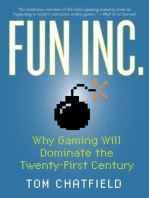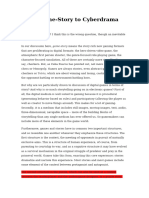Video Games and Computer Holding Power: Sherry Turkle
Video Games and Computer Holding Power: Sherry Turkle
Uploaded by
darodoanCopyright:
Available Formats
Video Games and Computer Holding Power: Sherry Turkle
Video Games and Computer Holding Power: Sherry Turkle
Uploaded by
darodoanOriginal Title
Copyright
Available Formats
Share this document
Did you find this document useful?
Is this content inappropriate?
Copyright:
Available Formats
Video Games and Computer Holding Power: Sherry Turkle
Video Games and Computer Holding Power: Sherry Turkle
Uploaded by
darodoanCopyright:
Available Formats
Video Games and Computer Holding Power
Sherry Turkle
I watch a thirteen-year-old girl in a small family caf in New York Citys Little Italy. Four electronic games lined up near the door clash with the murals of Italian seacoasts. The child too seems out of place. She is angry and abusive to the caf owner when he asks her if she would like something to eat. Get the fuck away from me. Im fucking playing your fucking games. The man shrugs, apparently used to the abuse of thirteen yearolds.The girl is playing Asteroids. A spaceship under her control is being bombarded by an asteroids shower. There are separate control buttons for steering, accelerating, and decelerating the spaceship and for firing its rocket guns against threatening asteroids and enemy ships. The player must keep up a steady stream of missiles as she maneuvers the ship. The finger on the Fire button must maintain a rapid staccato, an action that is tense and tiring. The girl is hunched over the console. When the tension momentarily lets up, she looks up and says, I hate this game. And when the game is over she wrings her hands, complaining that her fingers hurt. For all of this, she plays every day to keep up my strength. She neither claims nor manifests enjoyment in any simple sense. One is inclined to say she is more possessed by the game than playing it. The children playing with Merlin, Simon, Big Trak, and Speak and Spell at the shorediscussing whether their computer games could really cheatwere displaying that combination of innocence and profundity which leads many of us to believe in Piagets model of the child as philosopher. The scene on the beach had an aura of charming solemnity. The scene in the caf, like that in thousands of arcades and in millions of homes, is more violent. Somewhat older childrenfrom around nine or ten onare in a relationship to the machine that seems driven, almost evoking an image of addiction. Children musing about objects and their nature has given way to children in contest. Reflection has given way to domination, ranking, testing, proving oneself. Metaphysics has given way to mastery. For the girl in the caf, mastery of her game was urgent and tense. There is the sense of a force at work, a holding power whose roots are aggressive, passionate, and eroticized. There has been controversy about video games from the days of Space Invaders and Asteroids, from the time that the games holding power provoked people who saw it as a sign of addiction to become alarmed. The controversy intensified as it became clear that more than a games craze was involved. This was not the Hula-Hoop of the 1980s. By 1982 people spent more money, quarter by quarter, on video games than they spent on movies and records combined. And although the peak of excitement about the games may have passed with their novelty, video games have become part of the cultural landscape.
Not all of the arguments against video games can be taken at face value, for the debate is charged with feelings about a lot more than the games themselves. Protest against video games carries a message about how people feel about computers in general. In the past decade, and without people having had anything to do or say about it, computers have entered almost every aspect of daily life. By 1983 the computer had become so much and so active a part of the everyday that Time magazine chose it to fill the role usually given to a Man or Woman of the Year. Only one other gift of science has been so universally recognized as marking a new era of human life. That was atomic energy. It is an understatement to say that people are ambivalent about the growing computer presence: we like new conveniences (automated bank tellers, faster supermarket lines), but on the eve of a new era we, by definition, do not know where we are. The changes have been rapid and disquieting. We are ill at ease even with our children, who are so much at ease with a technology that many of us approach at arms length. They take it for granted. To them it is not a new technology but a fact of life. They come home from school and casually report that they are learning programming. The comment evokes mixed feelings. Parents want their children to have every advantage, but this new expertise estranges them. It seems to threaten a new kind of generation gap that feels deep and difficult to bridge. And so, for many people, the video game debate is a place to express a more general ambivalence: the first time anybody asked their opinion about computers was when a new games arcade applied for a license in their community or when the owner of a small neighborhood business wanted to put a game or two into a store. It is a chance to say, No, lets wait. Lets look at this whole thing more closely. It feels like a chance to buy time against more than a video game. It feels like a chance to buy time against a new way of life. Video games are a window onto a new kind of intimacy with machines that is characteristic of the nascent computer culture. The special relationship that players form with video games has elements that are common to interactions with other kinds of computers. The holding power of video games, their almost hypnotic fascination, is computer holding power. The experiences of video game players help us to understand this holding power and something else as well. At the heart of the computer culture is the idea of constructed, rulegoverned worlds. I use the video game to begin a discussion of the computer culture as a culture of rules and simulation.
You might also like
- Exodus to the Virtual World: How Online Fun Is Changing RealityFrom EverandExodus to the Virtual World: How Online Fun Is Changing RealityRating: 2.5 out of 5 stars2.5/5 (10)
- Rise of the Videogame Zinesters: How Freaks, Normals, Amateurs, Artists, Dreamers, Drop-outs, Queers, Housewives, and People Like You Are Taking Back an Art FormFrom EverandRise of the Videogame Zinesters: How Freaks, Normals, Amateurs, Artists, Dreamers, Drop-outs, Queers, Housewives, and People Like You Are Taking Back an Art FormRating: 4 out of 5 stars4/5 (19)
- Save Point: Reporting from a video game industry in transition, 2003—2011From EverandSave Point: Reporting from a video game industry in transition, 2003—2011No ratings yet
- Page 1 Research PaperDocument12 pagesPage 1 Research Paperapi-534228249No ratings yet
- Get Playing with feelings video games and affect 1st Edition Anable free all chaptersDocument52 pagesGet Playing with feelings video games and affect 1st Edition Anable free all chaptershermaledelmy100% (1)
- Desensitization Through Video Games A Device ParadigmDocument10 pagesDesensitization Through Video Games A Device ParadigmMuhammad Abdus SamadNo ratings yet
- Crawford On Game DesignDocument92 pagesCrawford On Game DesignfrancescoscretiNo ratings yet
- Art of PC Game DesignDocument81 pagesArt of PC Game DesignDenise RobertsonNo ratings yet
- Academic Reading 2Document6 pagesAcademic Reading 2jio879797009No ratings yet
- Double SideDocument32 pagesDouble SideR KristopherNo ratings yet
- Universiti Teknologi Mara Fakulti Kejuruteraan Kimia English For Critical Academic Reading (ELC 501)Document11 pagesUniversiti Teknologi Mara Fakulti Kejuruteraan Kimia English For Critical Academic Reading (ELC 501)Jaja TeukieNo ratings yet
- 2021.02.28. Reading T Do Is There More To Video Games Than People RealizeDocument2 pages2021.02.28. Reading T Do Is There More To Video Games Than People RealizeNguyễn TịnhNo ratings yet
- Research Paper Rough DraftDocument4 pagesResearch Paper Rough Draftapi-341338657No ratings yet
- Pre-Builder - U2 - RDocument11 pagesPre-Builder - U2 - Rphuc.tran13072004bkNo ratings yet
- Violent Videogames Contribute To Youth Violence ChantyDocument11 pagesViolent Videogames Contribute To Youth Violence ChantyChantal Del ValleNo ratings yet
- Complete Download Playing with feelings video games and affect 1st Edition Anable PDF All ChaptersDocument55 pagesComplete Download Playing with feelings video games and affect 1st Edition Anable PDF All Chaptersloopeposkalw100% (1)
- Do Video Games Promote ViolenceDocument3 pagesDo Video Games Promote Violenceauby25aubyNo ratings yet
- Handmade Pixels: Independent Video Games and the Quest for AuthenticityFrom EverandHandmade Pixels: Independent Video Games and the Quest for AuthenticityNo ratings yet
- Growing Up A GamerDocument9 pagesGrowing Up A GamerxavierjohanisNo ratings yet
- 7 Reasons Why Playing Games Is Good For AdultsDocument5 pages7 Reasons Why Playing Games Is Good For AdultsSilvana PaoliNo ratings yet
- I've Seen The Metaverse - and I Don't Want ItDocument4 pagesI've Seen The Metaverse - and I Don't Want ItEnglish CentreNo ratings yet
- Reading Diagnostic Test (I)Document7 pagesReading Diagnostic Test (I)simarkaur9905No ratings yet
- Violent Video Game Should Be ProhibitedDocument4 pagesViolent Video Game Should Be ProhibitedJatmiko Adi Nugroho AgribisnisNo ratings yet
- Galloway GamingDocument160 pagesGalloway GamingTiaRi13100% (1)
- The Evolution of Video Games: From Pong To Virtual RealityDocument1 pageThe Evolution of Video Games: From Pong To Virtual Realitytiticelestin98No ratings yet
- Lost in a Good Game: Why we play video games and what they can do for usFrom EverandLost in a Good Game: Why we play video games and what they can do for usRating: 4.5 out of 5 stars4.5/5 (7)
- Ger Shen FeldDocument6 pagesGer Shen FeldkadauberNo ratings yet
- Influence of Video Games On TeenagersDocument3 pagesInfluence of Video Games On TeenagersHafsa SajidNo ratings yet
- Argumentative Essay Sampale and FormatDocument2 pagesArgumentative Essay Sampale and Formatsamamaaug21No ratings yet
- GAMING SynopsisDocument35 pagesGAMING SynopsisSagar MukherjeeNo ratings yet
- Nintendo and TelosDocument23 pagesNintendo and TelosSimErnestoNo ratings yet
- Experimental Games: Critique, Play, and Design in the Age of GamificationFrom EverandExperimental Games: Critique, Play, and Design in the Age of GamificationNo ratings yet
- All Your Base Are Belong To Us VideogameDocument13 pagesAll Your Base Are Belong To Us VideogameEduardo Voltaire GarciaNo ratings yet
- Murray First Person 2-11Document10 pagesMurray First Person 2-11Carina IversonNo ratings yet
- Mcgonigal A Real Little Game Digra 2003Document25 pagesMcgonigal A Real Little Game Digra 2003MsAlexandra0% (1)
- From Game Story To Cyber DramaDocument10 pagesFrom Game Story To Cyber DramaCatia Cristina Sanzovo JotaNo ratings yet
- Video Games: Legacy of The Digital AgeDocument18 pagesVideo Games: Legacy of The Digital AgeAnastasiaIlinaNo ratings yet
- Download ebooks file Missions for thoughtful gamers 1st Edition Andrew Cutting all chaptersDocument75 pagesDownload ebooks file Missions for thoughtful gamers 1st Edition Andrew Cutting all chaptersbhanibemmelNo ratings yet
- Alexander Galloway "Gamic Action, Four Moments"Document38 pagesAlexander Galloway "Gamic Action, Four Moments"Rodrigo SepúlvedaNo ratings yet
- Capstone Academic EssayDocument6 pagesCapstone Academic EssayAlex LienNo ratings yet
- Schott - Sex in GamesDocument14 pagesSchott - Sex in GamesJose Luis Araneo50% (2)
- Philosophy and Video GamesDocument46 pagesPhilosophy and Video GamesDhvanil2012No ratings yet
- The Exploratory EssayDocument4 pagesThe Exploratory Essayapi-272826852No ratings yet
- The State of Play: Creators and Critics on Video Game CultureFrom EverandThe State of Play: Creators and Critics on Video Game CultureRating: 3.5 out of 5 stars3.5/5 (6)
- Stories and Studies of Gaming in Kenya Rwanda and Tanzania.Document35 pagesStories and Studies of Gaming in Kenya Rwanda and Tanzania.youssef aaiadiNo ratings yet
- Why Audiences Play GamesDocument4 pagesWhy Audiences Play Gamesapi-224303452No ratings yet
- Cmlit 490 Final PaperDocument13 pagesCmlit 490 Final Paperapi-251592269No ratings yet
- Negative Effect of VideogamesDocument5 pagesNegative Effect of VideogamesDavidVizcaínoNo ratings yet
- Video Games Synthesis EssayDocument7 pagesVideo Games Synthesis Essayapi-255911378No ratings yet
- Buy ebook Missions for thoughtful gamers 1st Edition Andrew Cutting cheap priceDocument67 pagesBuy ebook Missions for thoughtful gamers 1st Edition Andrew Cutting cheap pricewuriefachayv100% (1)
- Is There More To Video Games Than People RealizeDocument8 pagesIs There More To Video Games Than People RealizeThao Anh NguyenNo ratings yet
- 8 Myths About Video GamesDocument3 pages8 Myths About Video Gamesapi-278540192No ratings yet



























































